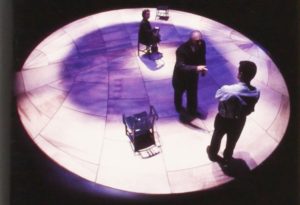Luke’s substantial narrative powers surely did not suddenly fail him in this third chapter. So we need a different kind of explanation for the curious way by which Luke frames up this part of the story. Consider:
First, we get the odd insertion in verses 19-20 about John’s imprisonment following his finally crossing the line with immoral old King Herod (the RCL oddly leapfrogs over this). This bit of news seems plunked there between soaring words about the nature of the coming Messiah and the report of Jesus’ actual baptism.
Second, there is the matter of this baptism. How understated can Luke get? He mixes Jesus in with the larger crowd, tells us Jesus was praying at some point, and then reports the descent of the Spirit but without giving us a single clue as to whether or not anyone other than Jesus witnessed this particular sign.
And then the whole thing is over and we slide, sideways it seems, into a long-ish listing of Joseph’s ancestors. It just doesn’t get much less dramatic, much more understated than this. So what is Luke up to? After expending huge amounts of narrative space and providing loads of intricate details on Jesus’ pre-birth and then birth narratives (Luke 1 and Luke 2 are among the longest chapters in the whole Bible), why now all of a sudden do we get so little by way of drama and detail? Why do we get to this point in Luke 3 only to have John the Baptist languishing in prison and Jesus seemingly being just a face in the crowd who, at the age of 30, hasn’t done a remarkable thing in his life yet?
Maybe it’s because Luke knows that this is finally how God operates. For all the grandeur and spectacle of the angels who popped in and out of Luke 1 and Luke 2, the number of people who saw and encountered those divine messengers could finally be counted on one or at most two hands. For all the times Luke listed for us the ruling authorities of the day, Jesus was born, was raised in Nazareth, and one day was showered with the Holy Spirit at the Jordan River all without a single one of those rulers noticing anything whatsoever.
For thirty years the Son of God in skin had been on this earth but never once did Caesar or Quirinius or Herod have any changes made to their legislative agendas on account of this divine presence. Never once did some harried aide rush in to the cabinet room or the office with frantic news about a new movement about which this particular big-wig simply had to be notified immediately. God had landed. God had made his move. A very few folks some three decades earlier had been let in on the secret that whatever it was God was up to, it had set the hosts of heaven to dancing.
But back in here on earth . . . life went on. Even John the Baptist was getting impatient. He ratcheted up the rhetoric near the end, picturing the coming Messiah as someone who would shake things up, throw around some fire, make it clearer than clear who was who in the wider scheme of things. And since nothing much else seemed to be happening, John took it up himself to upbraid Herod for his immoral shenanigans only to find himself slapped behind bars once and for all.
Score: Worldly Powers 1, Divine Powers 0
And yet . . . God had landed. God was on the move. God had made his move and nothing would ever be the same again. Perhaps Luke went for dramatic understatement at this point in his third chapter to provide a kind of semaphore of what faith is all about. The fact is—despite the utterly true stories he relayed to us in Luke 1-2—our days are not typically filled with angelic visits and divine miracles. We don’t often bump into a Simeon or an Anna who says jaw-dropping things to us or who in some other way encourage us in our journeys of faith.
Most days Jesus is a little hard to spy in the hustle and bustle of the everyday. Many days all the wrong people—including some really good people—get roughed up, locked up, killed even as some of the wickedest folks around go on their merry way with hardly a hair out of place. Most days we wish God would come down a kick a little tail, clear a threshing floor here or there, throw around some fire and perform a little razzle-dazzle to shake up the powers that be.
Mostly, though, it just doesn’t happen. The headlines seldom scream out the message “Jesus Is Lord!” “Breaking News” on CNN rarely leads to an uptick in anyone’s hope quotient. In this part of Luke 3, the Son of God in flesh came to be baptized. But Luke frames up the story right inside this real world, replete with all its unhappy events and apparent signs that chaos is in charge. Having made it clear in his first chapters that grand, galactic events were afoot, Luke now throttles back a bit to remind us that faith finally has to cling to God’s plan in the teeth of a whole lot of things that are not going to be nearly as obvious as angels dancing in the skies.
But take heart, Luke is saying by sounding this note of realism. Take heart: the Son of God came, the Spirit really did descend, and the Father was “well pleased” with how the whole project was going. Take heart.
Take heart on all those days when your spirit is locked up in some prison or another. Take heart on all those days when Jesus is at best a face in the crowd and you just cannot quite pick out his presence in your life on a Thursday morning or a Monday afternoon. Take heart on those days when all the wrong people seem to be wielding the axes and clearing various threshing floors even as God seems to be not nearly active enough.
Take heart. God has made his move. God is on the move. The Son is well pleasing to God because the Son has saved the world in a way no power, no prison, no disaster can touch. Reality is more than what you can see with your eyes, Luke is saying.
So take heart.
Textual Notes
Luke’s inclusion of Jesus’ baptism is presented rather oddly. Verses 19-20 tell us of John’s imprisonment after crossing up King Herod. Then, only after we learn this, do we learn from Luke (almost as though it were an afterthought and a brief retrospective look back at one little detail he had left out earlier) that Jesus showed up one day to get baptized, too. The baptism of Jesus is a central event. Yet it is striking how understated Luke is about it. Only Mark’s account is briefer. Why might this be? Is it part of Luke’s understated way of telling us that Jesus really was truly human, truly one of us, truly just another face in the crowd by all outward appearances? Perhaps. It is, in any event, worth pondering. Left to our own devices, WE would be unlikely to tell this incident the way Luke does. We’d make a bigger deal out of it, shine a spotlight onto it, lard it over with lots of explanatory words. Indeed, some of us in the Reformed tradition have a habit of not baptizing anyone without first reading a long-ish formulary as to the meaning of baptism and all the theology that surrounds it. Luke felt no such compunction. Why?
Illustration Idea
In the Broadway play Copenhagen, playwright Michael Frayn presents four versions of a single event. The event is a 1941 meeting in Copenhagen, Denmark, between physicists Niels Bohr and Werner Heisenberg. At that time Heisenberg was in charge of Adolf Hitler’s nuclear program even as Bohr was a Jew living in Nazi-occupied Denmark. Yet for some reason Heisenberg made a risky trip to meet with his old mentor. What did he want to talk about? No one is sure, so this new play presents four possible reasons (all a nice play on the Heisenberg Uncertainty Principle, too!).
Even the staging of the play makes viewers think about physics and atoms as the play is presented on an elliptical stage where the characters (only 3 in the whole play) represent protons and neutrons orbiting around an atom (a hydrogen atom perhaps).

But back to the story: We know that Heisenberg had dinner one evening with Niels and Margrethe Bohr after which, to escape the Nazi microphones bugging the Bohr house, the two men took a walk. But the walk ended within minutes when an angry Niels Bohr stormed back into the house. The evening ended abruptly as Heisenberg fled back to Germany. The two never spoke again.

Apparently what led to this unhappy conclusion to the evening was Heisenberg’s asking Bohr what he thought about the work that was then being done on nuclear energy. Bohr sensed immediately the implication: Heisenberg was working in a program that could ultimately lead to the Nazi development of an atomic bomb. As a Jew living under the thumb of the Nazis, Bohr was incensed and so said nothing more to his old friend. But was it just anger that made Bohr clam up? The play presents that possibility among others. But in the end it presents one final scenario–one with amazing implications.
Because when the war was over, it turned out that Heisenberg and the Nazis were not even close to getting the bomb right. But Bohr, following his escape from Denmark some while after the mysterious rendezvous with Heisenberg, worked with the Allies in successfully developing the bomb. Bohr may have known something that Heisenberg simply missed. The key piece of data was the “critical mass” of uranium-235 needed to make a bomb. The Nazis were under the impression that at least a ton of uranium was needed for just one bomb–an amount too heavy to be practical. As it turns out, a bomb can be made with twenty times less that amount–a fact that any well-educated physicist could figure out if only he executed a relatively simple equation. Bohr seems to have known this.
So why did Niels Bohr clam up once Heisenberg broached the subject of nuclear power? The play’s final scenario intriguingly suggests that perhaps Bohr knew that if he and Heisenberg had talked about this subject for more than a few minutes, Bohr may very well have inadvertently tipped Heisenberg off. And had this happened, it is possible that Hitler would have gotten a weapon with which conquer the world after all. If this scenario is true, then by holding back, Bohr rescued the world. It was the silence that saved.
Silence can be powerful. A play like Copenhagen toys with the idea that one man’s silence may have saved millions. But that’s the silence of a mere man. Just imagine the far greater effect if the one who goes silently into baptism, who goes wordlessly into the desert of death, is also the very Son of God. When that almighty one makes himself humble and vulnerable, when that divine Son holds back, the results are nothing less than cosmic. It’s a quiet epiphany, but it packs more wallop than a million renditions of the “Hallelujah” chorus ever could!
Dive Deeper
This Week:
Spark Inspiration:
Sign Up for Our Newsletter!
Insights on preaching and sermon ideas, straight to your inbox. Delivered Weekly!
Sermon Commentary for Sunday, January 13, 2019
Luke 3:15-17, 21-22 Commentary